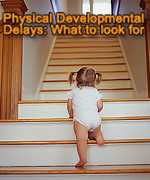Information for Early Childhood Educators
You spend your day working with, playing with, and watching children, and you are already familiar with many milestones – such as pointing at objects, smiling, and playing with others – that mark a child’s development. All children are unique, but sooner or later, you will see a child who is not developing as they should.
You are a valuable resource to parents! They look to you for information on their child, and they trust you. “Learn the Signs. Act Early.” has resources to help you educate parents on the full range of child development.
What is “Learn the Signs. Act Early.” and how can it help me?
Early Care and Education Primer
This primer is a one page resource sheet that highlights the benefits of integrating “Learn the Signs. Act Early.” resources within early care and education settings. The primer provides tips on using “Learn the Signs. Act Early.” materials in classrooms; tips for using “Learn the Signs. Act Early.” to boost family engagement; resources for discussing developmental concerns with parents; and ways to support providers’ professional development.
Primer in English [PDF – 799K] | Primer in Spanish [PDF – 2M]
Child Care Development Fund Primer
This primer is helpful for Child Care Development Fund (CCDF) grantees. It highlights the different CCDF requirements that “Learn the Signs. Act Early.” can help providers meet such as the CCDF health and safety training requirements, professional development requirements, and consumer and provider education provisions on family engagement. In addition, resources for discussing developmental concerns with parents and ways to support professional development are included as well.
Primer in English [PDF – 614K] | Primer in Spanish [PDF – 1M]

Tools and Resources
“Learn the Signs. Act Early.” materials are not a substitute for standardized, validated developmental screening tools.
“Learn the Signs. Act Early.” For Early Care and Education Providers”
Free Online Continuing Education Training Course
Watch Me! Celebrating Milestones and Sharing Concerns
Milestones in Action photo and video library
View a FREE library of photos and videos of children showing developmental milestones, organized by age and developmental domain.
Birth to 5: Watch Me Thrive!
Birth to 5: Watch Me Thrive! is a coordinated federal effort to encourage healthy child development, universal developmental and behavioral screening for children, and support for the families and providers who care for them.
Tips for Talking with Parents about Developmental Concerns
This tip sheet provides sample conversations of ways to regularly talk with parents about their child’s development and also provides tips for talking to parents when you have concerns.
English | Spanish
“Go Out and Play!” Kit for early childhood educators
The campaign is happy to offer a new tool to help you monitor childhood development during an activity you do everyday with your students – play! The kit also contains information about monitoring developmental milestones, suggestions for a safe and successful activity day, tips about talking to parents if you suspect a child has a developmental delay, and a special pullout section with activities to share with parents for at-home play.
Milestones
See milestones that children should reach from 2 months to 5 years of age, plus interactive tools for parents and staff to help keep track of the milestones. Print out milestone checklists for parents or your staff to complete. This information is useful to all parents as a child begins a new school year or celebrates a birthday.
Understanding developmental milestones can make you a better teacher! Read about Developmentally Appropriate Practice.
Include “Learn the Signs. Act Early.” Print Ad in Your Newsletter
We have a print ad that would be great to include in your newsletter to tell parents about the campaign.
English JPG (Zip file)
English PDF
Spanish JPG (Zip file)
Spanish PDF
Link Your Website to Ours
We have developed a button that provides an icon, Web address, and description to help you put a link on your site.

Links to Other Websites
Center for Evidence-Based Practice: Young Children with Challenging Behavior
The Technical Assistance Center on Social Emotional Intervention for Young Children, also known as TACSEI, takes the research that shows which practices improve the social-emotional outcomes for young children with, or at risk for, delays or disabilities and creates free products and resources to help decision makers, caregivers, and service providers apply these best practices in the work they do every day.
The Center on the Social and Emotional Foundations for Early Learning (CSEFEL)
CSEFEL is focused on promoting the social emotional development and school readiness of young children birth to age 5. They have user-friendly training materials, videos, and print resources which are available directly from this website to help early care, health and education providers implement this model.

National Association for the Education of Young Children (NAEYC)
NAEYC provides accreditation for schools that meet certain standards, as well as resources, tools, and information for families and childcare providers.
Early Childhood Technical Assistance Center (ECTAC)
The Early Childhood Technical Assistance Center (ECTAC) works to strengthen the systems that provide early childhood services under the Individuals with Disabilities Education Act (IDEA). The center’s mission is to ensure that children with disabilities (birth through 5) and their families receive and benefit from high-quality, culturally appropriate, and family-centered supports and services.
Zero to Three
Provides professionals working with very young children and their families an extensive collection of resources aimed at supporting the work of professionals in a variety of early childhood settings.
Child Care Aware
Child Care Aware is a program of Child Care Aware® of America and helps families learn more about the elements of quality child care and how to locate programs in their communities. Child Care Aware also offers resources for families and for child care providers.
- Page last reviewed: February 21, 2017
- Page last updated: September 15, 2017
- Content source:



 ShareCompartir
ShareCompartir